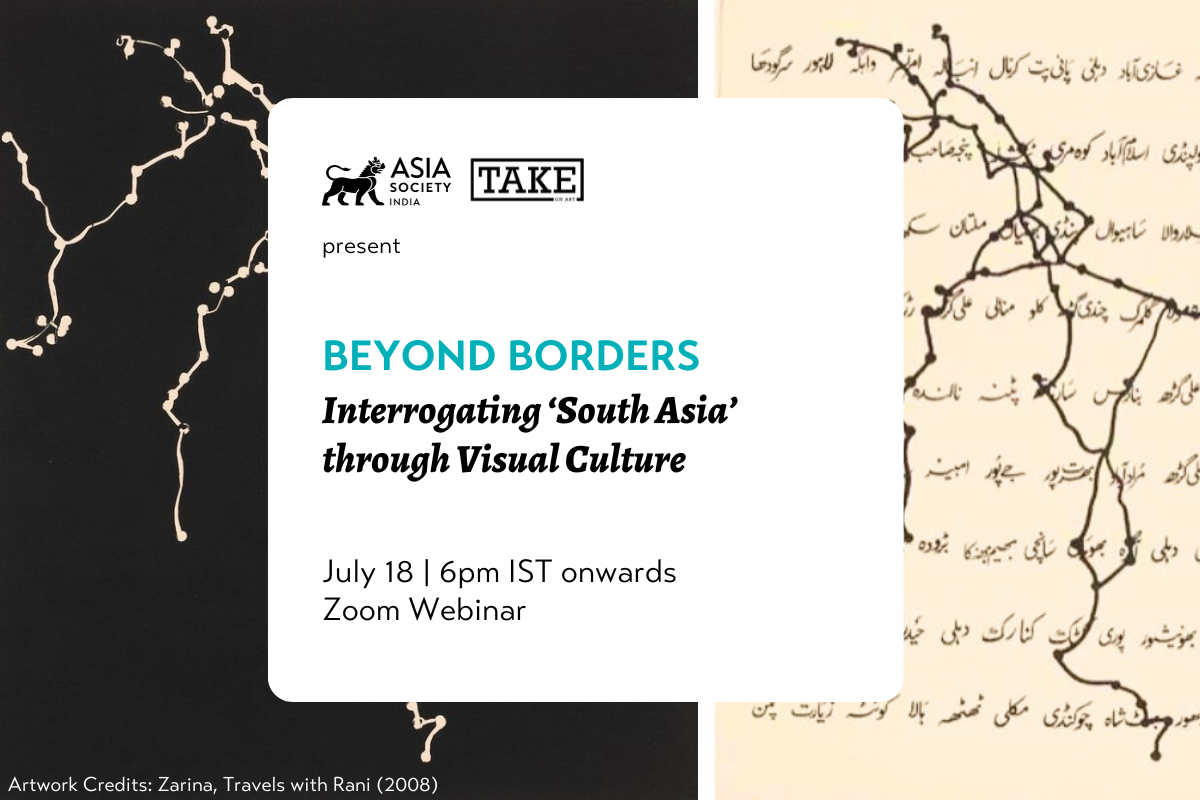Beyond Borders: Interrogating 'South Asia' through Visual Culture
VIEW EVENT DETAILSThursday, 18th July, 6pm onwards

"The term ‘South Asia’ has long served as an important geographic and geopolitical marker for both civilisational as well as modern narratives of the subcontinent", writes curator Sabih Ahmed in the introductory note to TAKE South Asia, published in 2023. He continues: "While its current definition is largely inherited from the British Empire, it has had multiple re-evaluations over the last century, with attempts to bridge if not represent continuities across vastly distinct cultures, religious beliefs, languages, eco-systems and economic traits". In contemporary discussions on South Asia, one has seen these "continuities" being read as affinities within the subcontinent, making the case for shared representation and a common identity for the region. Cultural Encounters: South Asian History in the 'Third Space, an ongoing series by Asia Society India, for example, examines the history behind these affinities - the ways in which traditions, ideas, cultures and societies in the region have collided to create the complex composite that is understood as 'South Asia' today. Extending this idea, we now turn our focus to art history and contemporary culture as an alternate window through which to further probe the idea of 'South Asia'. Can art reveal what the identity means to people today - across geographies, communities, social hierarchies? Are there multiple, even conflicting, interpretations that are possible? What role does individual, regional identity play? And who controls the dominant narrative?
Asia Society India Centre, in collaboration with Take on Art, brings together cultural voices from across the subcontinent: Tanzim Wahab from Bangladesh, Sharareh Bajracharya from Nepal, Qudsia Rahim from Pakistan, along with Sabih Ahmed, to interrogate these complexities. Taking its cue from Ahmed's Questionnaire on 'South Asia', which concludes his note in TAKE South Asia, the discussion aims to critically examine the ways in which arts institutions or cultural forums in the subcontinent play a role in deconstructing 'South Asia'. Further, the session will also explore the institutional implications of identifying as 'South Asian' and the ideas that get privileged or marginalised in the process. And finally, it will help us think about ways in which South Asian art history responds to a Global South approach to contemporary visual culture.
SPEAKERS

Sharareh Bajracharya is an art educator and currently the director of Srijanalaya, a Nepal-based arts organization that believes in the expressive power to bring joy and freedom into people's lives. She looks for systemic ways for the arts to foster the curiosities of young children, young adults, and communities around them. She also teaches at Kathmandu University Department of Art and Design and the School of Education and has edited/produced children’s books. A recent endeavor was directing the nonprofit art exhibition Kathmandu Triennale 2077 with a team of brilliant cultural practitioners.

Tanzim Wahab is a curator, researcher and lecturer. He is the festival director of Chobi Mela International Festival of Photography, Bangladesh. Wahab, alongside Munem Wasif, has published two editions of Kamra – a comprehensive publication in Bengali, setting ideas and debates of photographic history and theories. He has headed several curatorial research projects and exhibitions. In 2018, he was awarded a curatorial grant by The Foundation for Indian Contemporary Art (FICA) and Korean Cultural Centre India (KCCI) for the project (Dis) Place – an exhibition about displacement; looking at the possibility of a post-historical space and function as a symbolic “act of discharge” on Bangladesh’s fractious histories and geographies (with Hadrien Diez). Wahab has also been a fellow of several programs, including Art for Social Change, United States, and Art Think South Asia (ATSA), India, among others.

Qudsia Rahim is the co-founder and executive director of the Lahore Biennale Foundation (LBF). She has a background in both art and academia, and has established several initiatives, including the field elective program at the National College of Arts called Art For Humanity; the Research Cell at LBF, which conducts research on various forms of artistic expression within Pakistan and its diaspora; and the Afforestation Lahore Group, "a consortium of the government and civil sector that addresses the loss of local/urban ecology and other urgent environmental challenges." As the Executive Director of LBF, Rahim also leads the organization's efforts towards the upcoming Lahore Biennale 03, "Of Mountains and Seas," curated by John Tain. Rahim also holds positions on several distinguished boards, including Chairperson of the Book Selection Committee at the Quaid-e Azam Library, a Member of the Board of Lahore Arts Council, and has been the advisor to the Office of Chief Minister of Punjab on Arts and Culture.

Sabih Ahmed is the Director of Ishara Art Foundation in Dubai. His work focuses on modern and contemporary art of South Asia mapped through diverse itineraries and inter-disciplinary formations. At Ishara, he has catalysed artist-led curations, international collaborations and partnerships alongside his own curatorial projects that include ‘Navjot Altaf: Pattern’, and ‘Notations on Time’ co-curated with Sandhini Poddar. Since 2023, he has been a guest faculty at the Teaching Artist Fellowship organised by the Department of Culture and Tourism, Abu Dhabi. Ahmed is on the Advisory Board of the Sher-Gil Sundaram Arts Foundation in Delhi and on the Editorial Board of Tselinny Centre of Contemporary Culture in Almaty. His writings have been featured in various publications and magazines. He is the co-author of ‘Mass Traffic’ with Lantian Xie, published by Kunsthalle Bern and Mousse Publishing in 2023.